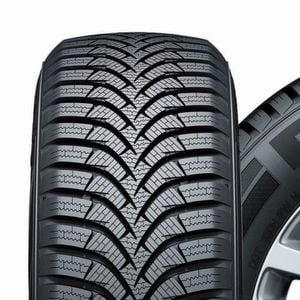Last Updated on 18.12.2024 by hrushetskyy
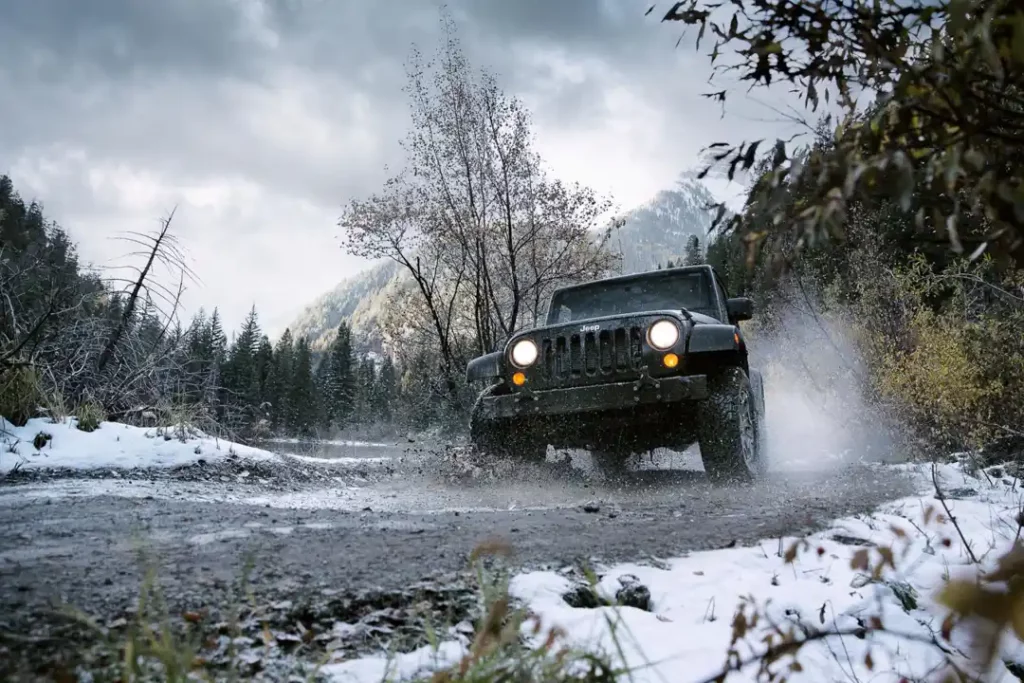
Off-road tires are the ultimate companion for the rugged terrain trail, designed to tackle much more than a smooth highway. Built to withstand the demands of challenging landscapes, these tires offer the strength and grip needed to carry a vehicle, driver, passengers, and cargo over rocks, sand, mud, gravel, and other off-road surfaces.
Thanks to their specialized tread patterns, off-road tires feature wider grooves and larger lugs that provide maximum traction in diverse environments. Reinforced sidewalls and puncture resistance add an extra layer of durability, helping to avoid damage and ensure a safer journey on even the roughest paths. Whether you’re an adventurer driving a “seen-it-all” truck or just need reliable traction on unpaved roads, off-road tires are engineered to go wherever you dare to drive.
How off-road tires work when street driving?
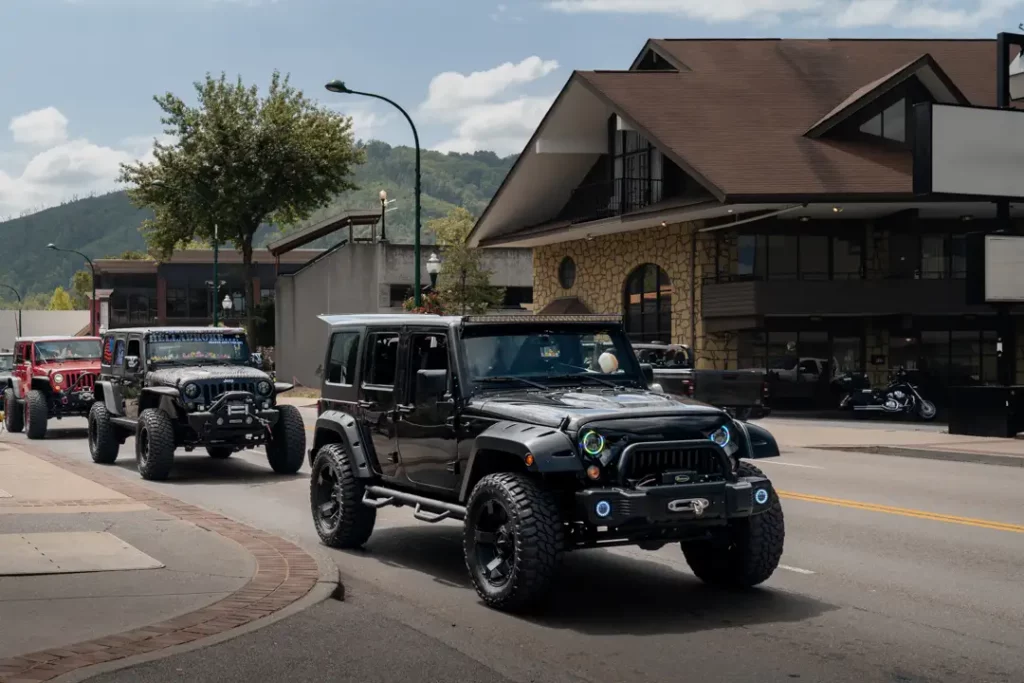
Well, you don’t wear hiking boots to a dance party, right? Off-road tires on pavement feel a bit like that – they’re rugged and ready for adventure but a bit out of place on the smooth streets. Due to the lack of contact patch area, they are typically worse than street tires on pavement. In the “civilized” conditions, they provide less grip and are quite noisy. However, there is a type of tire that gives adequate performance on all surfaces, including both paved roads and off-road.
3 main types of off-road tires and their performance
There are three main types of off-road tires:
- All-terrain (AT)
- Mud-terrain (MT)
- Sand.
All-terrain tires
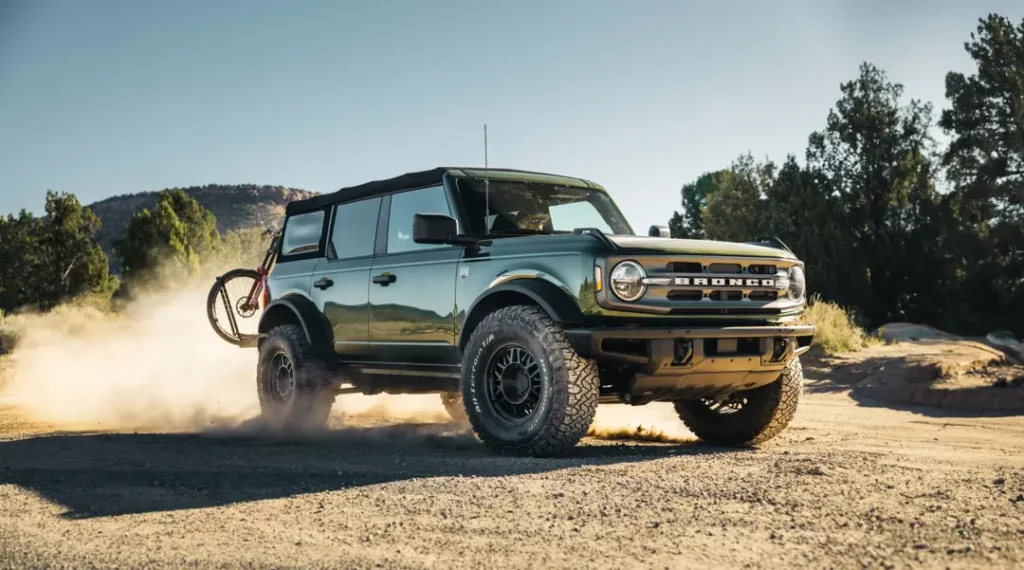
All-terrain tires are good for people who often switch from highways to off-road use and vice versa. Their tread consists of large blocks and deep grooves that continue to a part of their sidewalls. They also have smaller center blocks, which provide enough traction and less noise during on-road use. These tires have lifespans of up to 50,000 miles due to the compounds added to their rubber blend.
These off-road tires perform adequately on mud, rock, sand, etc., but they are rough on highways, impacting ride comfort.
These tires can also be used all year, including in cold winters. However, in temperatures lower than 44,6 F, their performance will be mediocre at best, much worse than that of cheap winter tires.
You should consider AT tires if you need regular quality on and off-road and if the winters in your area aren’t cold and snowy. Using such off-road tires only on paved roads may result in cupping, while using them only off-road may be insufficient. In this case, you may require a more aggressive tread.
You can learn more about all-terrain tires and how they differ from other types from this post.
Mud-terrain tires
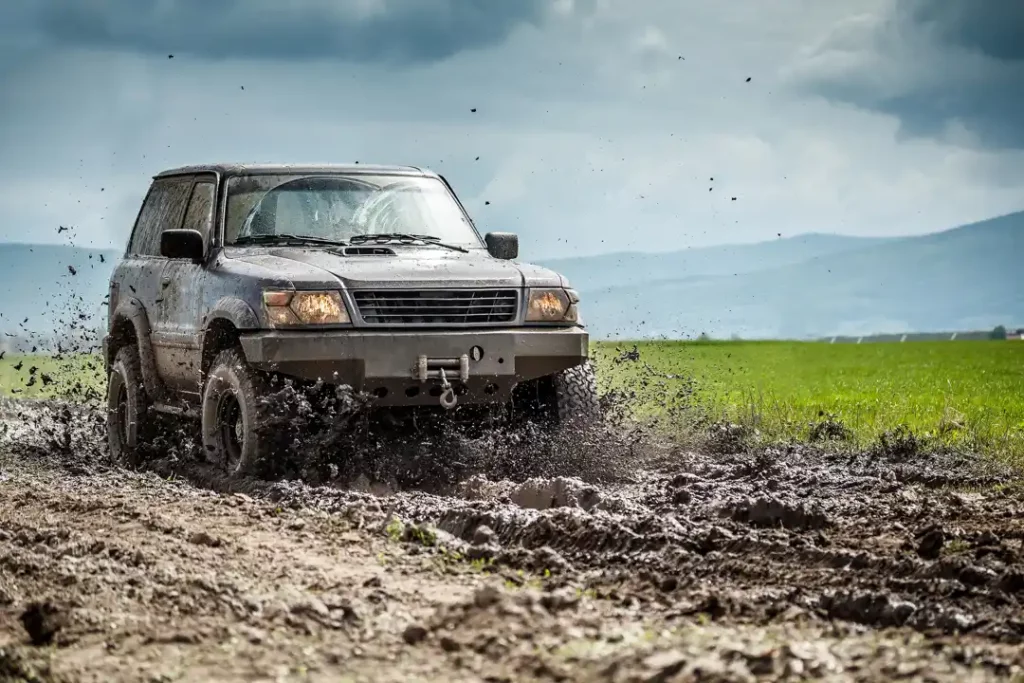
Mud-terrain tires are mostly for off-road use, especially on muddy surfaces. Their tread is more aggressive, the blocks are larger, and the channels are wider. Mud doesn’t pack into the tires’ grooves, and even if some of it does, most MT tires nowadays clean themselves of it. Dirt, debris, and mud channels through the grooves, just as water does in regular street tires. The same goes for deep snow, so mud-terrain tires are good for year-round use. However, they won’t keep your vehicle stable on ice due to the lack of contact patch area.
MT tires have stiff sidewalls, which absorb shock from impacting uneven surfaces. The tread is also quite durable, but not as much as all-terrain tires. The rubber compounds in these off-road tires are softer, providing better grip on all surfaces. This is why they wear faster and cost more. MT tires are also noisy and rough when used on highways and may be less stable on wet roads.
Sand tires
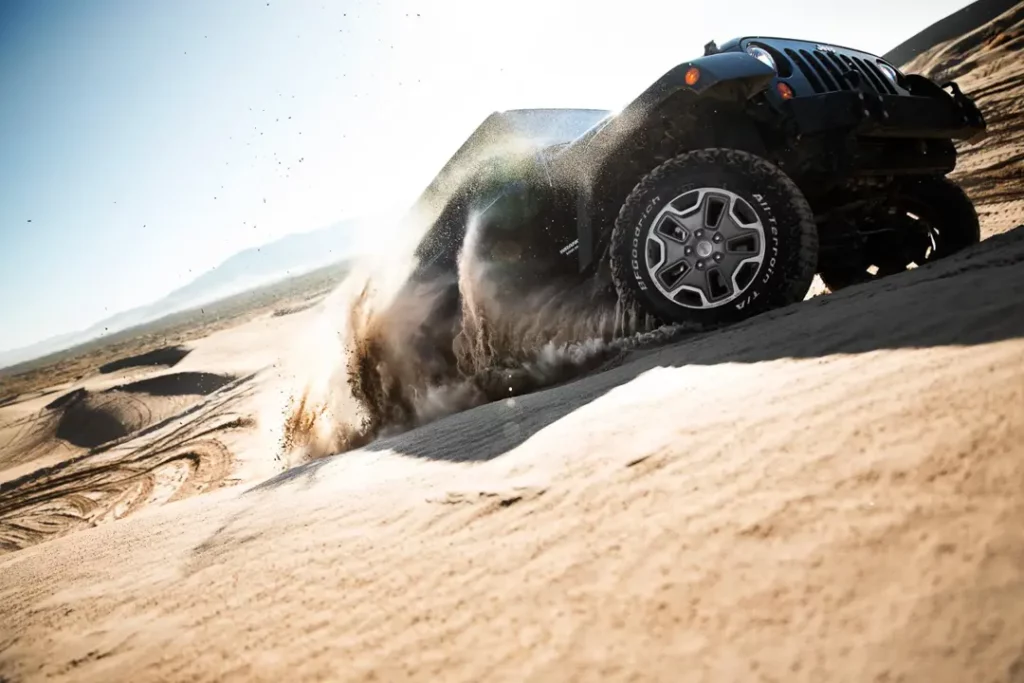
Sand tires provide good traction on sand, helping move through dunes.
These have special extrusions that appear horizontally across the tire or in a V-shape. They help churn sand and move through it successfully. Such off-road tires are usually specialized and used for particular sports activities and tours.
Off-road tires construction
Off-road tires are usually radial or bias-ply.
Radial tires have plies horizontally across the tire’s surface, from bead to bead. On top of that main layer, there are several stabilizing plies. Such tires usually cause less rolling resistance, improving fuel economy. Moreover, they provide smoother rides, which makes them great for street use. Radial tires also take longer to wear and help keep a vehicle under control. Most tires on the modern market are radial but are not in the off-road niche.
Bias-ply tires have been proven to be better for off-road use due to the shared casing plies for their tread and sidewalls. While radials have plies at a 90-degree angle, bias-ply tires have crisscrossed steel layers at a 30-degree angle. The shared plies improve tire flexibility and allow for better traction and self-cleaning capacities. However, the increased flexibility is also a disadvantage if used on-road. It causes more rolling resistance, which increases fuel consumption.
Bias-ply off-road tires keep any minor puncture in place, preventing its expansion and making it possible to plug it and finish the travel.
5 best off-road tire brands
Here are the 5 best brands manufacturing off-road tires:
Goodyear off-road tires
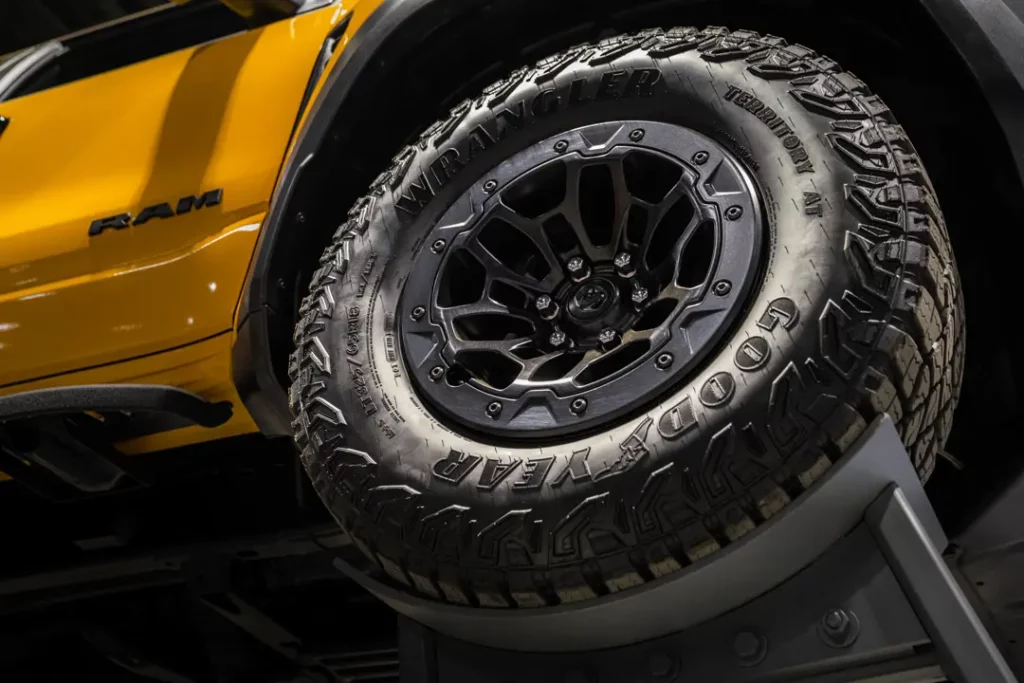
Goodyear Tire and Rubber Company is one of the two all-American tire brands that manufacture all kinds of tires, from sport to heavy off-road. Wrangler is one of the company’s most popular off-road lineups. They are mostly all-terrain tires, which provide great on- and off-road performance. However, if you need a more aggressive tread, try Wrangler DuraTrac®. They have reinforced sidewalls (which help the tires to be puncture-resistant) and improved silica rubber compounds.
Mickey Thompson off-road tires
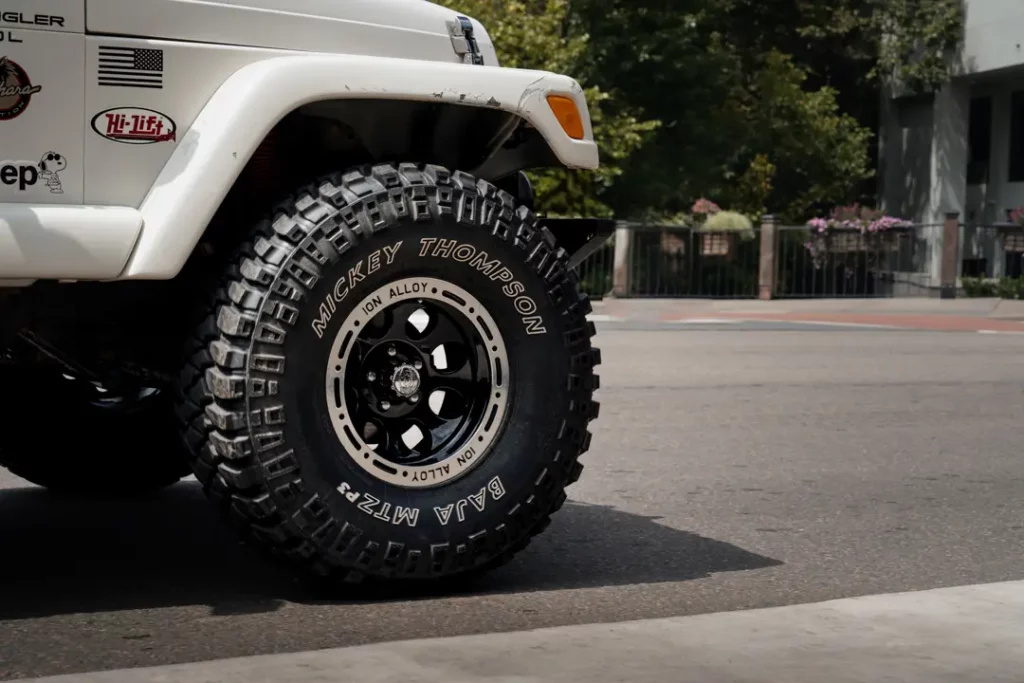
Mickey Thompson is now a Cooper Tire and Rubber Company subsidiary, specializing in high-performance tires for different uses, including off-road. The Baja ATZ-P3 lineup is one of this brand’s most popular off-road tires. They have an advanced compound that improves cut resistance. Furthermore, their sidewalls have a 3-ply PowerPly special feature. These are all-terrain tires, but if you need a mud-terrain off-road tire from this brand, you might like Baja MTZ. They offer high mileage and excellent off-road traction, with self-cleaning capabilities. Baja MTZ are great tires for mud and deep snow use, as the substances don’t pack into their grooves.
BFGoodrich off-road tires
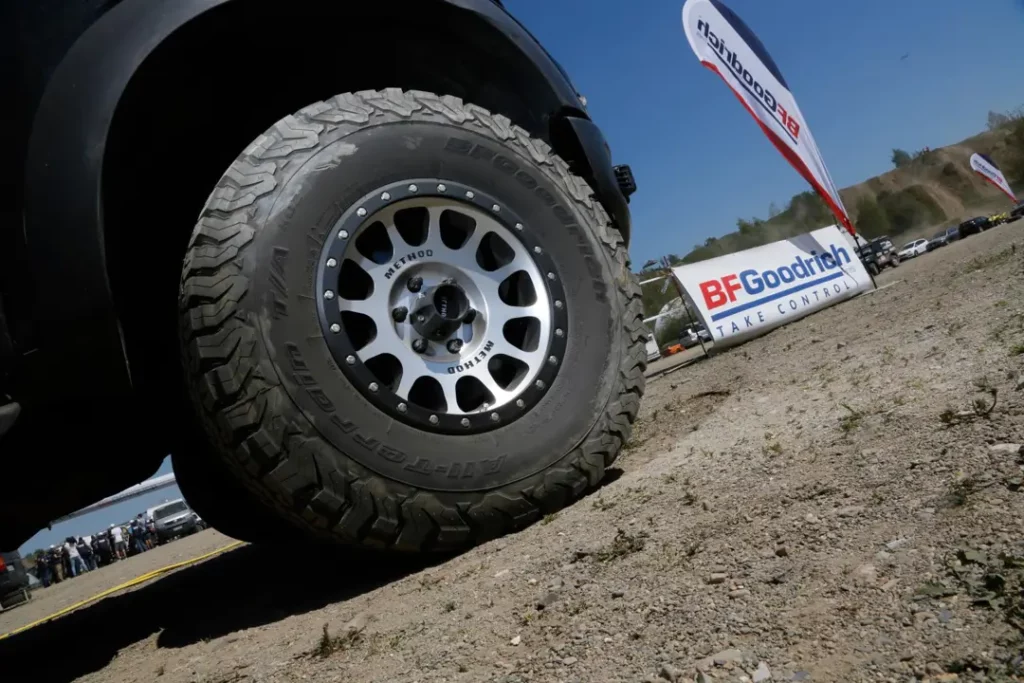
BFGoodrich is one of the most popular tire companies in the world. Even used BFGoodrich tires are generally of good quality. They manufacture products for all vehicle applications, including off-road tires. Their most popular off-road lineup is All-Terrain T/A KO2. Their shoulder grooves are 40% wider. They provide a long lifespan, damage resistance, and strong bead construction. A great mud-terrain lineup is Mud Terrain T/A KM2. These off-road tires’ construction involves special linear flex zones, which help grab and drive over obstacles much more easily.
Dick Cepek off-road tires
Another Cooper subsidiary, Dick Cepek, specializes in off-road tires. Their Fun Country lineup is one of their most popular. They fall somewhere in between all-terrain and mud-terrain tires. Their tread is 18.5/32” deep, and the lateral grooves help resist damage and clean the tire with their special Stone Kickers. Moreover, their sidewalls add to their safety and puncture resistance. The sipes of these tires help keep the grip great all year long.
Toyo off-road tires
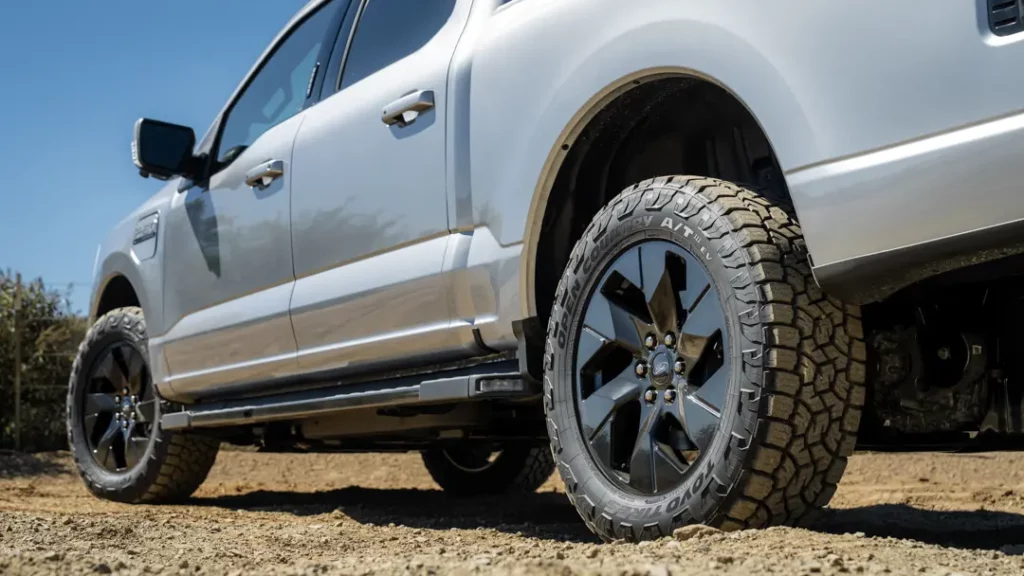
Japan-based Toyo Tire and Rubber Company manufactures a high-quality off-road tire lineup: Open Country. Their Open Country M/T tires provide excellent traction on pavement, rock, mud, snow, and other surfaces. The over-the-shoulder tread construction guarantees deep mud and snow grip. Their sipes are also quite deep, which helps them move on wet surfaces and ice.
UTires expert’s choice: the best off-road tire models
Goodyear Wrangler All-Terrain Adventure
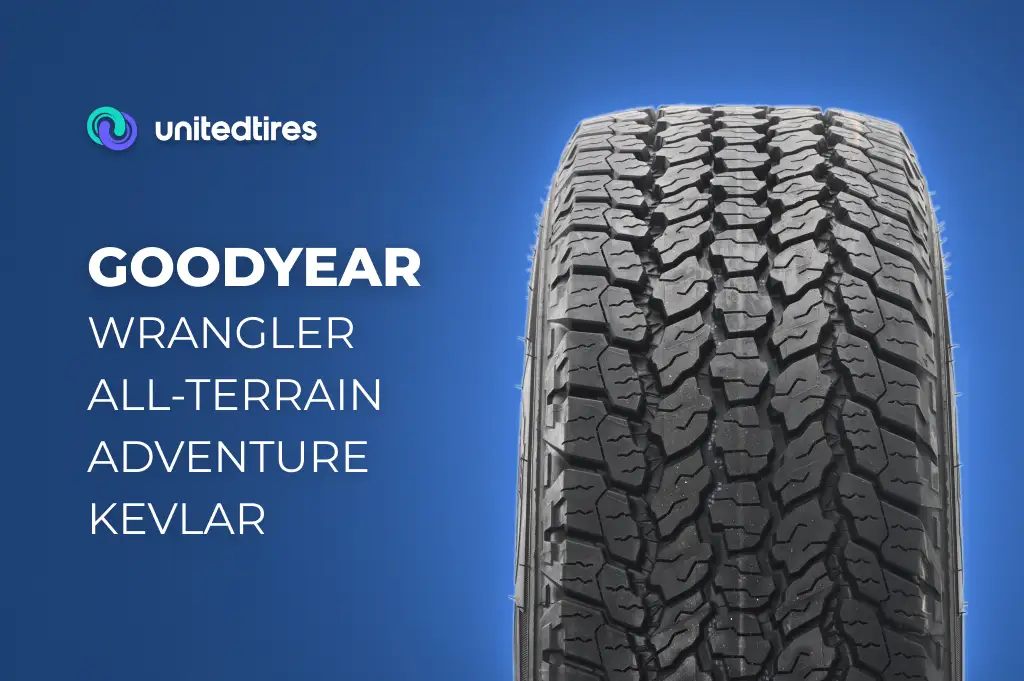
The Goodyear Wrangler All-Terrain Adventure is a versatile all-terrain tire designed for SUVs and 4x4s, providing reliable performance across various conditions. It is known for its durability and offers excellent dry handling, strong wet grip, and low noise levels. It is comfortable on-road. Off-road, it performs well on dirt and mud, although its resistance to aquaplaning is somewhat limited. The tire is 3PMSF (Three-Peak Mountain Snowflake) rated, which qualifies it for moderate winter conditions, though it isn’t ideal for deep snow. Its harder compound provides a good grip on challenging surfaces but may slightly increase rolling resistance.
Mickey Thompson Baja Boss A/T
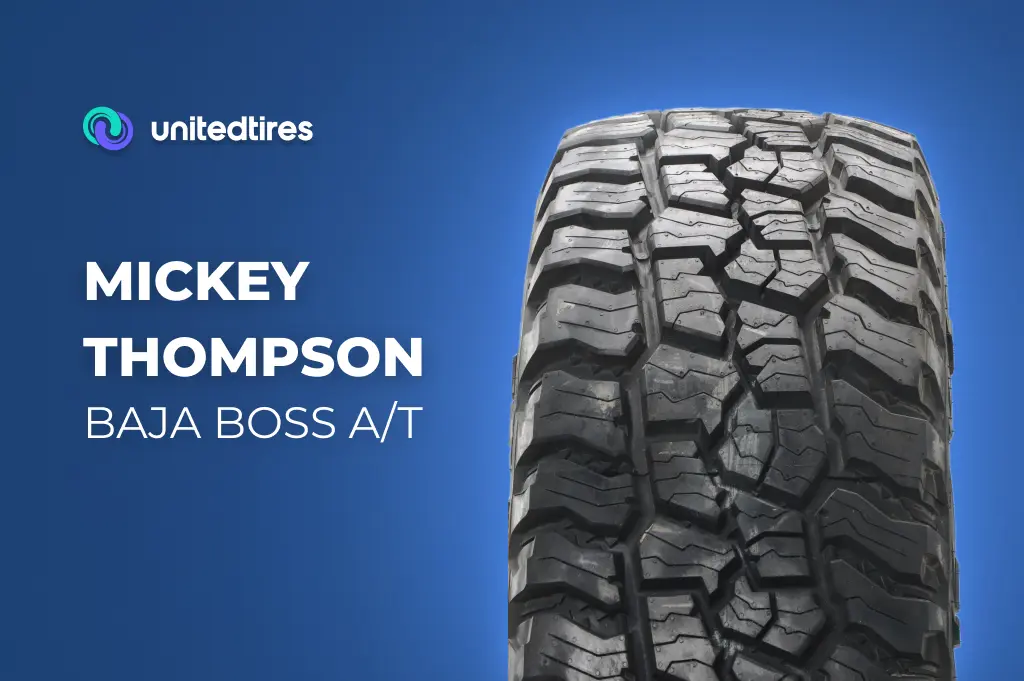
The Mickey Thompson Baja Boss® A/T is a premium all-terrain tire engineered for both on-road and off-road. Its asymmetric tread pattern reduces noise and improves handling across various conditions. The tire features Extreme Sidebiters®, which are 150% deeper than those on the Baja ATZP3™, giving improved off-road traction and protection. The PowerPly™ XD construction incorporates a denser cord in the angled third ply, offering better puncture resistance and quicker steering response. A silica-reinforced compound improves wet handling, braking performance, and tread life.
The Baja Boss® A/T comes with a 50,000-mile treadwear warranty for LT sizes and a 60,000-mile warranty for SUV sizes. It also carries the 3PMS (Three-Peak Mountain Snowflake) symbol, which certifies capability in severe snow conditions.
BFGoodrich All Terrain TA KO3
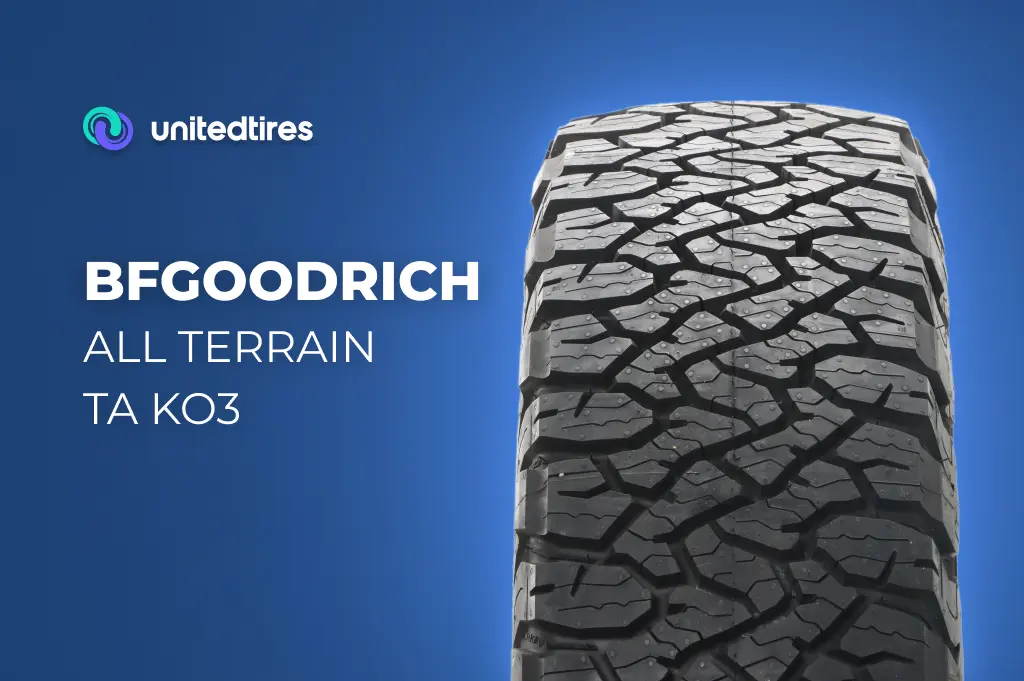
The BFGoodrich All-Terrain T/A KO3 is a robust all-terrain tire designed for trucks, Jeeps, and SUVs, offering reliable performance on and off the road. Building upon the success of its predecessor, the KO2, the KO3 features an optimized tread pattern that improves durability and grip across various terrains. It incorporates the CoreGuard Technology, which provides improved sidewall protection against cuts and bruises even in challenging conditions. The tire meets the Three-Peak Mountain Snowflake (3PMSF) severe snow requirement, indicating its capability in snow conditions. User reviews highlight its superior dry and wet grip, road feedback, handling, and comfort, with an overall rating of 88% over 1,000 miles driven.
Dick Cepek Fun Country
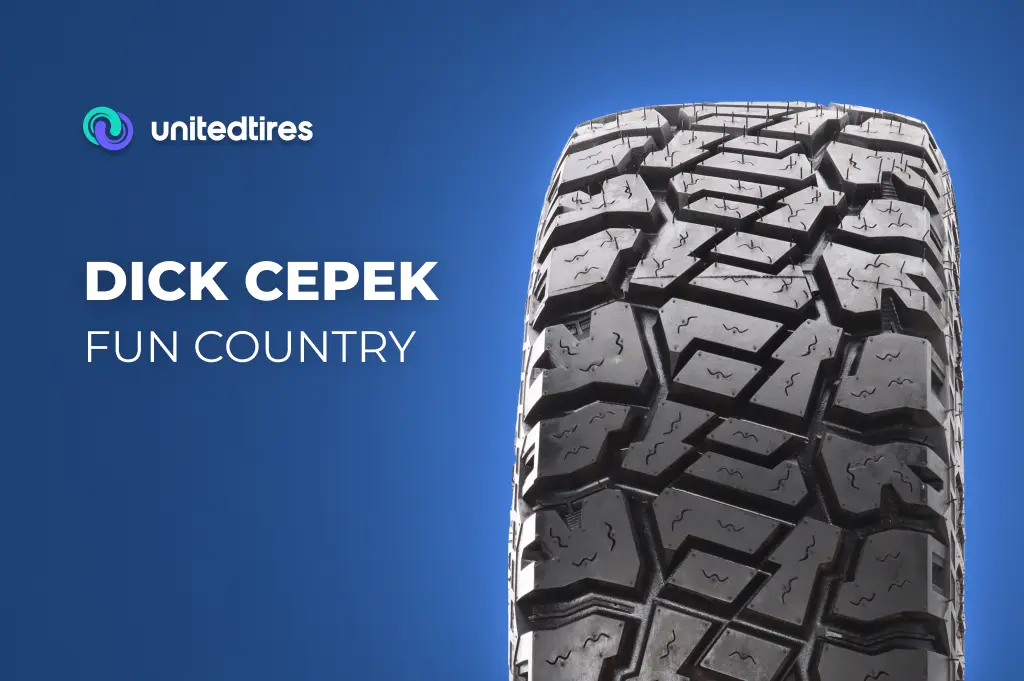
The Dick Cepek Trail Country is an all-terrain tire for light trucks and SUVs, combining off-road capability with on-road comfort. Its hybrid tread pattern, featuring large blocks and deep sipes, provides traction on loose surfaces like dirt, gravel, and light mud and also maintains stability on paved roads. Wide grooves help channel water away, reducing hydroplaning risks and improving wet-weather performance. The tire’s cut-resistant tread compound and reinforced sidewalls improve durability, even on rough terrain. Designed for quiet performance, the optimized tread pitch minimizes noise, making it suitable for daily driving and off-road adventures alike.
Toyo Open Country A/T II
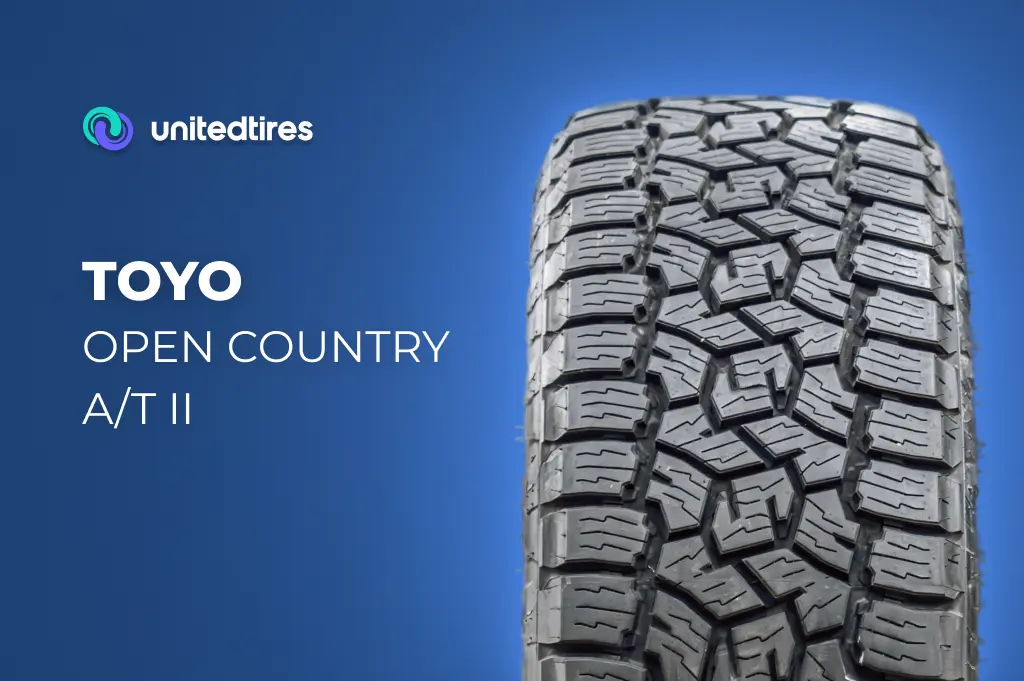
The Toyo Open Country A/T II tire is engineered for drivers who need versatility across various terrains, from highways to forest trails. Its aggressive, asymmetric tread design features rigid blocks forming five ribs, enhancing durability and providing exceptional steering response at high speeds. This design provides optimal handling in off-road conditions and reliable traction on loose surfaces like dirt and gravel. The tire’s construction includes a durable compound that resists cuts and chips, extending its lifespan even if used in challenging environments.
The Open Country A/T II is designed to minimize road noise for a quieter and more comfortable ride on paved surfaces. Wide grooves that effectively channel water away bolster its performance in wet conditions, reducing the risk of hydroplaning. This tire is suitable for SUVs and 4x4s, providing a balanced solution for drivers who require both on-road comfort and off-road capability.
Tire- and wheel-related tips to consider when going off-road
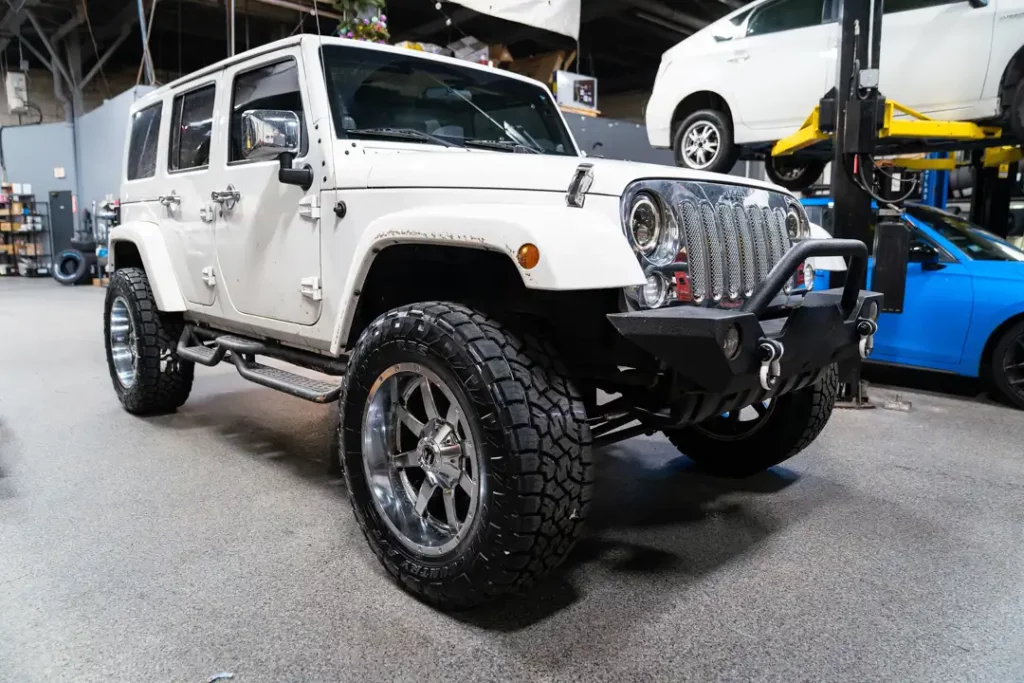
Here are some things to do to ensure safety and avoid problems when going off-road.
Check the tires and wheels
Inspect your vehicle and see if the tires are balanced and rotated and if the wheels are aligned. Also, check your off-road tires for damage and treadwear/uneven wear. Even if you do it regularly, find time for an extra check before going on an off-road trip.
Know your tire limits
Make sure you know the load and speed capacities of your tires, and don’t exceed them. Do your best not to load the vehicle to the maximum if you prefer driving off-road on slightly under-inflated tires. You can find information on your tire specifications in the code on its sidewall.
Let some air out
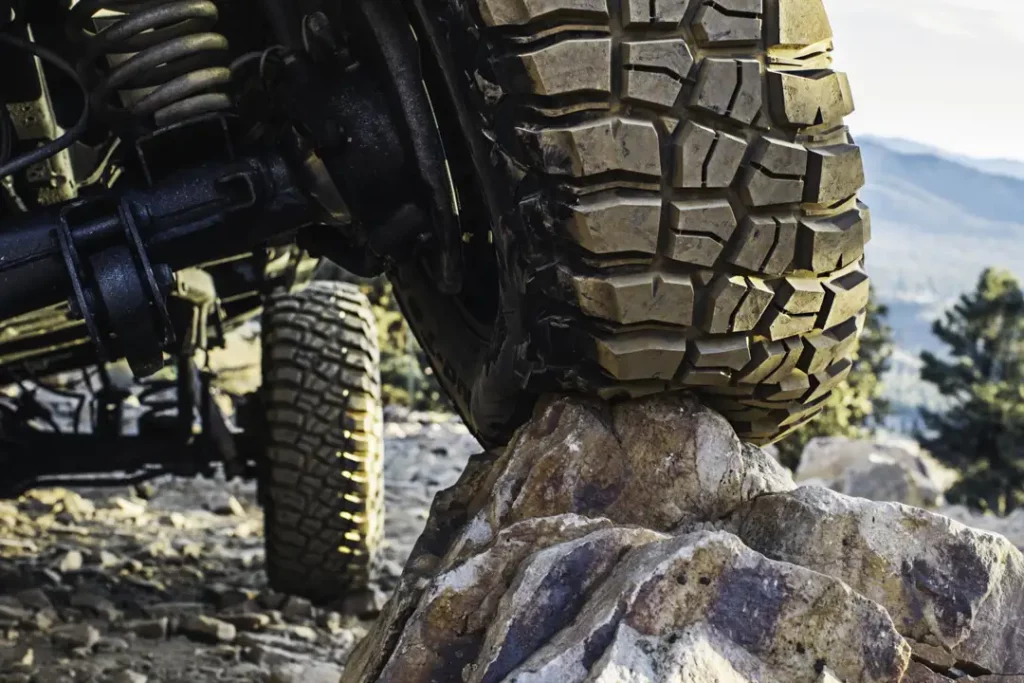
Decreasing the inflation of your off-road tires will increase the contact patch area. This will help you drive more easily on off-road surfaces. The tires will flex and move over rocks, trees, and debris without any damage. When driving on snow or sand, lower pressure will help you avoid digging into the surface and getting stuck. Regular vehicles specialized in rock-crawling have tires with 8 psi or even lower.
However, remember that letting too much air out may make the tire go flat and come off the rim.
Benefits of lower tire pressure
Reducing tire pressure, or “airing down,” is a common off-road practice that improves traction and ride comfort. Lower tire pressure increases the tire’s contact patch, allowing it to grip the terrain better.
Technical tips for airing down
- Ideal PSI: The recommended PSI for airing down varies but generally falls between 15-20 PSI for most off-road conditions. Consult your tire manufacturer’s guidelines for precise recommendations.
- Contact patch: Lowering tire pressure increases the contact patch, which improves traction on soft surfaces like sand and mud.
According to the Rubber Manufacturers Association (RMA) study, reducing tire pressure by 25-30% can improve off-road traction by up to 40%.
Safety considerations for letting the air out
While airing down improves traction, it also makes the tires more susceptible to damage from sharp objects. Always reinflate your tires to the manufacturer’s recommended pressure before returning to paved roads.
Mounted off-road tires? Avoid rapid speed changes and moves
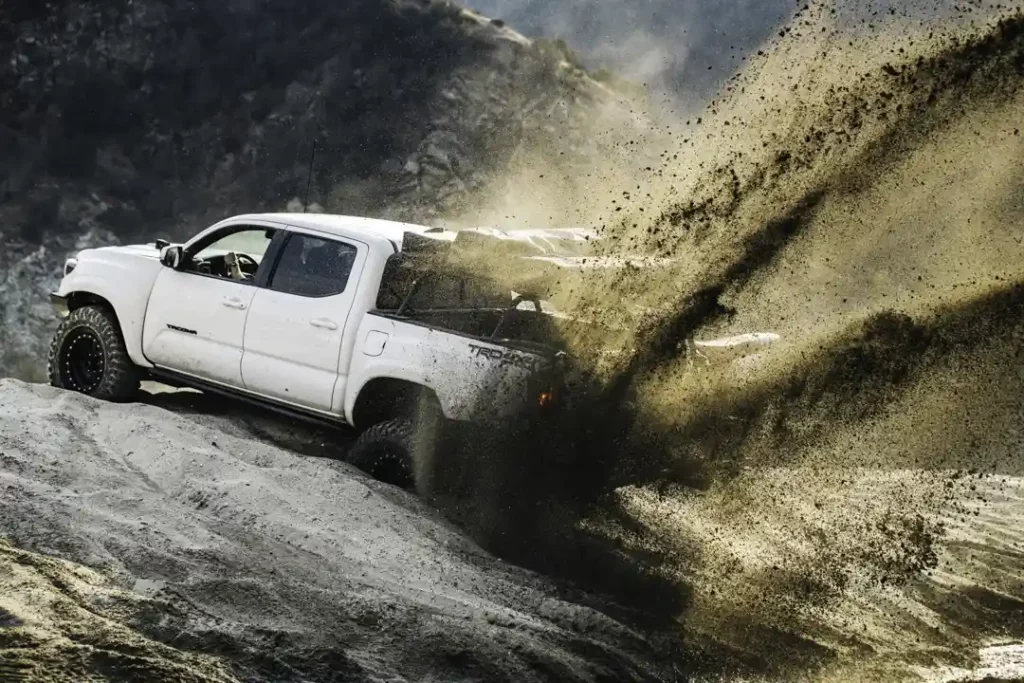
Don’t rush. Go as slow as you can yet as fast as you need, and give your off-road tires some time to get used to the surface. After some time, they will provide a much better grip, and you will be able to increase the speed. You should also avoid rapid moves and adding throttle if you start spinning or sliding. Instead, slow down and guide your wheels gently until they find traction.
Check your front wheels’ and vehicle’s positions
Always lean out of the window to make sure your front wheels are in their proper position. Just because you keep the steering wheel straight does not mean the wheels will be straight. If you think you are about to become stuck or there’s a maneuver to be done, steer slowly, bit by bit.
NOTE: Be careful; keep your thumbs inside the steering wheel. Rapid kickbacks from debris may break them.
As for the vehicle, don’t stop in deep ruts or try to avoid them completely, if possible. Drive where the ground hasn’t been touched, but if there are ruts everywhere, make sure you are at the highest point. Ignoring this may cause even the best off-road tires to get stuck in the ground or even sink, especially if the surface is muddy and porous.
Switch to 4-Wheel-Drive (4WD) when going onto dirt
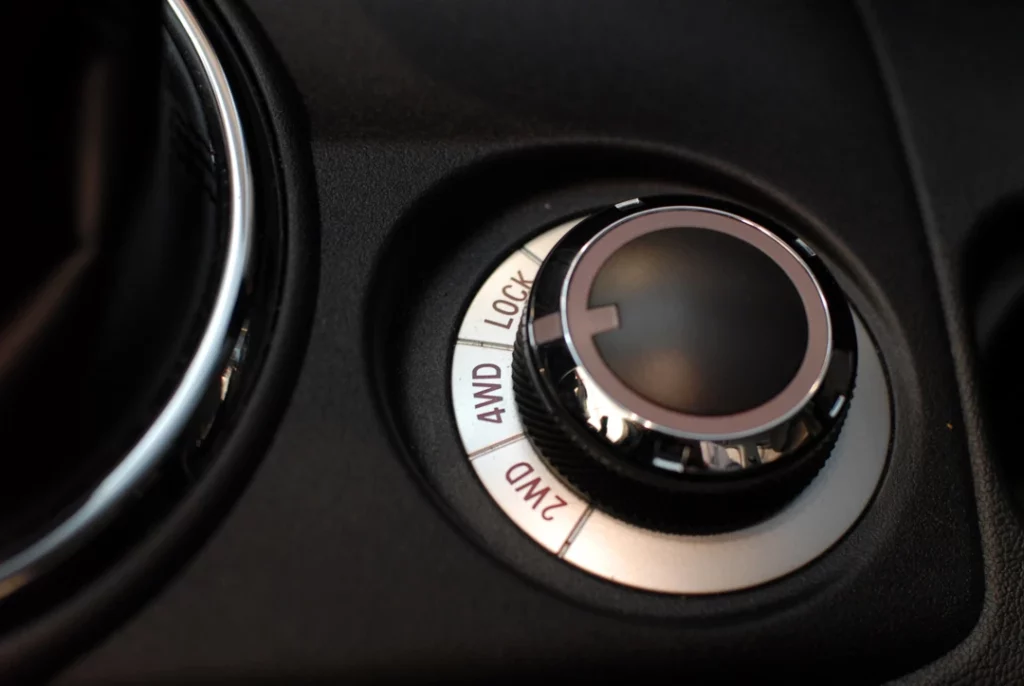
If you own an all-wheel-drive off-road car, you will have to lock the center differential. Shift into 4WD as soon as possible, as when your tires start spinning, you may already be stuck. Shifting at that stage may not help solve the problem.
Also, keep in mind that some of the roughest off-road trails may require additional 4WD Low-Range control. This will help you improve traction and regain control of the situation. In this mode, power runs through additional gears, improving pulling power.
NOTE: Don’t engage/disengage low-range at speeds higher than 2-3mph.
Making an off-road adventure successful
Choosing the right tires for the right surface will help you avoid most problems that may occur when going off-road. Make sure to check the weather before going on a trip, as the off-road ground may change from dirt to mud if it’s raining heavily. Don’t forget a tire repair kit and other tools to help you repair your vehicle or get out of deep ruts. It would also be wise to plan all parts of your trip so you know what surfaces and potential obstacles to be prepared for.
With high-quality and suitable off-road tires, any surface or weather is conquerable.
Buy reliable and cheap off-road tires
Looking for reliable off-road tires that deliver top traction and stability on even the toughest terrains? Explore our wide selection of both new off-road tires and high-tread used ones. Every used tire undergoes a rigorous 3-stage quality inspection, including visual and automated checks, ensuring you get the performance you need at up to 50% off the price of the new one. Plus, enjoy free FedEx delivery straight to your door!
Frequently Asked Questions
What are off-road tires?
It’s a category of tires that are designated for off-road traction. The main characteristics are wider grooves, larger lugs for maximum traction on extreme off-road surfaces, and reinforced sidewalls for puncture resistance.
What are the best off-road tires?
The five best brands of off-road tires are Goodyear, Mickey Thompson, BFGoodrich, Dick Cepek, and Toyo.
Can off-road tires be used on road?
No. Their rugged construction makes them “uncomfortable” for a ride on “civilized” surfaces. They are loud and provide much less grip than typical highway tires.
Do offroad tires use more fuel?
Yes. They consume more fuel due to heavier construction, increased rolling resistance, reduced aerodynamics, and lower air pressure.
Do off-road tires ride rough?
Yes. They give a rough ride both on a highway and rugged terrain.
Share the Knowledge
